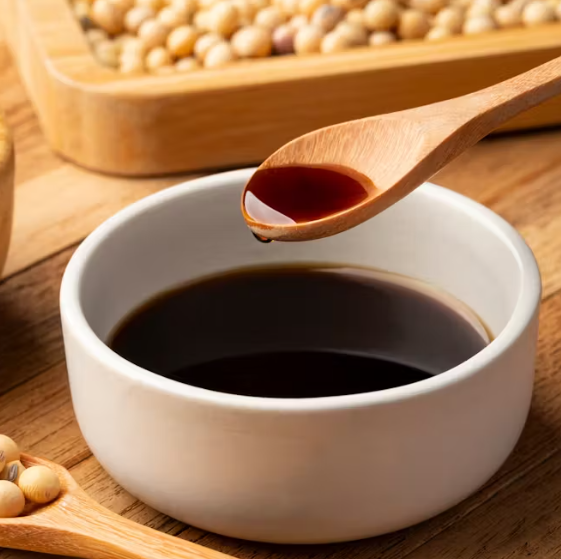
Is Soy Sauce Healthy? Exploring Benefits, Risks, and Healthier Alternatives
Soy sauce is a common condiment that enhances the flavor of many dishes, especially in Asian cuisine. While it adds a savory umami taste, many wonder about its health implications, particularly its high sodium content. For those with concerns about hypertension or heart disease, the sodium levels in soy sauce can raise red flags.
As health-conscious eating continues to rise, there are now healthier soy sauce alternatives, such as low-sodium and gluten-free options, which promise to offer the same rich flavor without the excessive salt. In this article, we’ll dive into the nutritional profile of soy sauce, its health benefits, potential risks, and how to incorporate it into a balanced diet.
What is Soy Sauce?
Soy sauce is a dark, salty condiment made from the fermentation of soybeans, wheat, and salt. This ancient sauce originated in China over 2,000 years ago and has spread globally, influencing culinary traditions worldwide. There are various types of soy sauce, each offering unique flavors and salt levels:
-
Traditional Soy Sauce: This is the classic variety made through natural fermentation, giving it a deep, complex flavor.
-
Light Soy Sauce: A lighter version in both color and taste, it’s less salty and often used in cooking rather than as a dipping sauce.
-
Dark Soy Sauce: Known for its thicker consistency and sweeter taste, it’s frequently used in braises and marinades.
-
Low-Sodium Soy Sauce: A healthier alternative with less salt, popular among those watching their sodium intake.
-
Tamari: A gluten-free soy sauce with a similar taste to traditional soy sauce, ideal for those with gluten sensitivities.
Nutritional Profile of Soy Sauce
Soy sauce, while small in serving size, offers several key nutrients but is also known for its high sodium content. Here’s a breakdown of the nutrients found in a typical tablespoon (15 mL) of soy sauce:
| Nutrient | Regular Soy Sauce (1 tbsp) | Low-Sodium Soy Sauce (1 tbsp) |
|---|---|---|
| Calories | 10-15 kcal | 10-15 kcal |
| Sodium | 900-1000 mg | 500-600 mg |
| Carbohydrates | 1-2 g | 1-2 g |
| Protein | 1 g | 1 g |
| Fat | 0 g | 0 g |
| Iron | 0.1 mg | 0.1 mg |
| Manganese | 0.1 mg | 0.1 mg |
| Vitamin B6 | 0.1 mg | 0.1 mg |
| Folate | 1-2 mcg | 1-2 mcg |
Sodium Content
The high sodium content in soy sauce is its most notable aspect. Regular soy sauce contains around 900-1000 mg of sodium per tablespoon, which is about 40-45% of the daily recommended intake for sodium. For those concerned about blood pressure or heart health, it’s crucial to use soy sauce sparingly.
Low-sodium versions reduce the sodium content to around 500-600 mg per tablespoon, which is approximately 20-25% of the recommended daily intake, offering a healthier alternative.
Other Nutrients
In addition to sodium, soy sauce provides small amounts of protein, carbohydrates, and trace minerals like manganese and iron. While not significant in large quantities, these nutrients can contribute to a balanced diet. Soy sauce also offers B vitamins, especially vitamin B6, which supports metabolism and nervous system health.
MSG in Soy Sauce
Many soy sauces contain added monosodium glutamate (MSG), a flavor enhancer that intensifies the savory taste. However, naturally fermented soy sauces contain naturally occurring glutamates. If you’re sensitive to MSG or prefer to avoid it, check the label for added MSG or opt for brands that advertise MSG-free products.
Health Benefits of Soy Sauce
When made naturally through fermentation, soy sauce can offer several health benefits:
-
Gut Health Support
The fermentation process of soy sauce produces probiotics like Lactobacillus and Bifidobacterium, which help maintain a healthy gut microbiome. These probiotics aid digestion, nutrient absorption, and may even improve mood regulation due to the gut-brain connection. Though soy sauce isn’t as rich in probiotics as foods like yogurt or kimchi, it still contributes to digestive health when included in a varied diet. -
Antioxidants and Anti-inflammatory Effects
Soy sauce contains phenolic compounds that act as antioxidants, reducing oxidative stress and inflammation in the body. These compounds may help lower the risk of chronic diseases, such as heart disease, type 2 diabetes, and certain cancers. The fermentation process increases the antioxidant levels, making soy sauce a potent source of anti-inflammatory benefits. -
Heart Health
Soy sauce contains isoflavones, plant-based compounds that can improve heart health by reducing LDL cholesterol levels and enhancing blood vessel function. The amino acids in soy, including glutamate, also help lower blood pressure and improve circulation. However, due to the sodium content, it’s important to use soy sauce in moderation to avoid counteracting these benefits. -
Bone Health
Soy sauce provides small amounts of isoflavones, which have been linked to improved bone health, particularly in postmenopausal women. Isoflavones can help reduce the risk of osteoporosis by improving bone density. While soy sauce isn’t as rich in isoflavones as soy-based foods like tofu, it still offers a modest source that can support bone health when consumed as part of a balanced diet.
Potential Risks of Soy Sauce
While soy sauce offers several health benefits, it’s important to be mindful of its risks:
-
High Sodium Content
The sodium content in soy sauce is a major concern, especially for individuals with high blood pressure or those at risk for heart disease. A typical tablespoon can contain up to 1000 mg of sodium, so it’s important to use soy sauce in moderation. Low-sodium varieties are a better option for those managing their sodium intake. -
Gluten and Soy Sensitivities
Traditional soy sauce contains wheat, making it unsuitable for people with gluten intolerance or celiac disease. Additionally, soy sauce contains soy, which can be problematic for those with soy allergies. Tamari, a gluten-free soy sauce alternative, is available for those with dietary restrictions. -
MSG and Additives
Some soy sauces may contain added MSG, which can cause reactions in sensitive individuals, such as headaches or digestive discomfort. If you are sensitive to MSG, look for soy sauce labeled “no added MSG” or opt for naturally fermented options. -
Overuse and Portion Control
Even low-sodium soy sauce can contribute to excessive sodium intake if used in large amounts. It’s important to practice portion control, using about 1-2 teaspoons per serving, and combining soy sauce with other seasonings to reduce overall sodium intake.
Healthier Alternatives to Soy Sauce
For those looking to reduce sodium or avoid soy, several alternatives to soy sauce are available:
-
Coconut Aminos: A soy-free, gluten-free alternative with a slightly sweeter, milder flavor. It’s lower in sodium and perfect for those on low-sodium or gluten-free diets.
-
Tamari: A gluten-free soy sauce that offers a richer flavor without the wheat, suitable for people with gluten sensitivities.
-
Liquid Aminos: Similar to soy sauce, but made with non-GMO soybeans or vegetables, it provides a milder flavor and lower sodium content.
Conclusion
Soy sauce can be a flavorful and healthful addition to your diet when used in moderation. It offers benefits such as supporting gut health, providing antioxidants, and promoting heart and bone health. However, due to its high sodium content, it’s important to consume soy sauce sparingly, especially for those with blood pressure concerns.
For a healthier option, consider low-sodium soy sauce or tamari. By making informed choices and using soy sauce as part of a balanced diet, you can enjoy its rich flavor while minimizing potential health risks.




